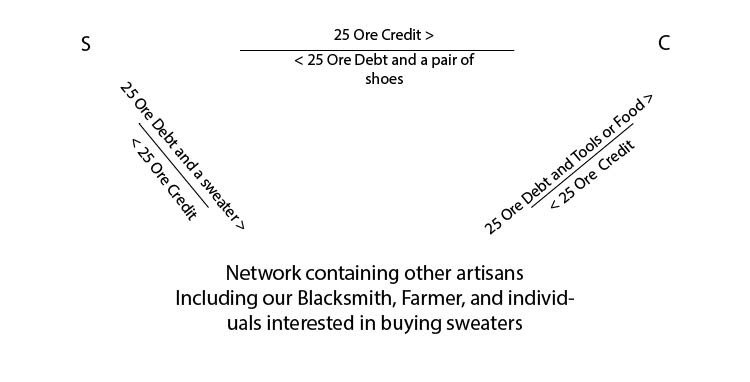Proposition for an Artisanal Trade Network

(This post is cross posted on Medium)
Why
In the Summer of 2016, I had the pleasure of attending The Slow Food Network’s Terra Madre Salone del Gusto. Artisan food producers from across the globe came together to share their crafts and to discuss ways to affect policy and to keep their cultures alive. I came away from this with a thought: Artisans should be able to afford artisanal goods.
The Situation
Let’s presume I knit sweaters. Knitting a simple sweater can take anywhere from 22 to 40 hours, let’s say I’m really fast, If I want to pay myself a living wage, (in California right now minimum wage is S10.50 an hour and a living wage is considerably higher), but let’s say I pay myself minimum wage, so that is:
22hrs x $10.50 = $231
That sweater now costs over $231 dollars, this is before I calculate in the material costs, marketing, and other costs that go into running a business. This better be a damn nice sweater because it is now only easily accessible to the definably rich.
Now, let’s say I, a sweater knitter, working for the equivalent of minimum wage, want to buy a new pair of handmade shoes from my friend the cobbler. For the sake of simplicity let’s presume our cobbler takes a similar amount of time to make a pair of shoes as I do a sweater, and has the same material costs and wage that they pay themselves. So my shoes should cost me $231, or over half a week of wages, presuming I work 40 hour work weeks. “Ah! An equitable solution”, you say. “You can simply trade the Cobbler a sweater for the shoes”. And gladly I would, but remember, that is still half a week’s lost wages, rather pricey while working for minimum wage. Neither I nor the Cobbler can afford the goods of the other. We are forced into selling our handmade goods to those with more capital than ourselves while we must shop for our clothing and shoes at Walmart or Payless.
Let us however make this oh so equitable trade. I offer the Cobbler a sweater for a pair of shoes. Here arises another issue. The cobbler already has a sweater and instead wants food, and a new set of tools for his trade. Note, neither of the Cobbler’s needs are dispensable. Food, for obvious reasons, and their tools are needed in order that they might continue to practice the trade which is their livelihood. So I go to the farmer, and to the blacksmith, and offer them sweaters in exchange for food and for tools that I might exchange them for shoes. And so finally I have gone from creating a sweater, to having shoes on my feet, by way of a farmer, or a blacksmith. And this is how in the rural communities of the past, and even in a few still today, trade would happen. This is in some sense the most primal form of currency, no medium of exchange, just the flow of information ensuring everyone's needs are met within the community. Fairly simple in a small town where you know everyone by name, but let us see if we can formalize and modernize this system.
A Proposition
But wait, we still haven’t made it affordable for our artisans to buy artisanal goods. Let us carry on and see if we can at least positively affect that situation as well.
In updating this system the first thing we need to create is the marketplace, the network of participants. In this case artisans interested in trading their goods and services for those of other artisans. Etsy provides a good example of a modern artisanal marketplace. Excuse me, a modern marketplace of artisanal goods, the market place itself is not artisanal, it is not handmade in that same sense. Let’s repurpose that for our needs, let’s create a digital marketplace owned by its users in order to facilitate inter-artisan trade. For this example, let’s call it “Bitsy”. What are our requirements for this marketplace?
- First, it should be as globally accessible as possible.
- Second, Membership should be free (This flows from the first requirement and the fact that global economics make it nearly impossible to set a price that does not present a barrier to entry for someone.)
- Third, there needs to be a form of authentication and moderation, both for the acceptance of new members and for community upkeep.
- Fourth, in order to minimize the required online presence of its members Bitsy should also act as an open marketplace to nonmembers.
- Fifth, a decentralized and communal method of governance of the network.
Requirements 1,2, and 4, are all easily met by most membership based web-stores, Etsy included. In order to meet the fifth requirement I would suggest setting up a decentralized governance modal (or DAO), similar to that currently being worked on by Aragon which would vote to decide on the allocation of network funds for paying developers, legal fees, etc. (A small percentage sales fee will be taken from all extra-network transactions for the maintenance of the network.) The DAO would also set rules for the network.
In order to cover the Third requirement a moderator system similar to that used on online forums would be implemented, although personally I like the idea of keeping it entirely peer to peer without any hierarchies (reputation and down voting systems could work similar to eBay or Steemit,), and new members would be required to have a certain number of established members vouch for them and to keep a good standing maintained in the network in order to keep their membership. (The vouching process could be done digitally with members submitting video of their work spaces, uploading product images and descriptions, etc. and then having all of this hand reviewed by other members in a similar fashion to democracy.earth’s attention mining.)
Now the name of Bitsy makes some arbitrary sense at least as the operation of the aforementioned DAO should run on a Blockchain for it’s security (or could potentially use similar technology such as Holochain), with a vote token and smart contracts used to operate. In addition I would go so far as to suggest that the data of the entire public website is (some combination of), kept on chain and utilizes IPFS, similarly to Steemit. Having no central servers this further removes the organization from being controlled by any one person or group.
A Medium of Exchange
At this point we have a user owned online marketplace. Now, our original mission was to make artisanal goods affordable to artisans, or at least to try and make them reasonable. One way to do this is to make sure artisans are better paid, and creating better networks and marketplaces for them is a good start. The other way we have already discussed is to facilitate inter-artisan trade. To do this I would propose creating a network only currency, the value of which would be directly tied to time. This would allow artisans to value their goods based solely on the time they put into them and their material costs. It also allows us to extend this trade internationally. The hours spent knitting a sweater in Mumbai or NYC are the same and if we are to affect the current economic and colonial system in a positive way then we must value those two sweaters the same, hopefully creating less of a wealth divide both locally and globally. If you know that you are always trading peer to peer, artisan to artisan, you can ignore local economics and profit margins.
The network only currency (Let’s call it “Ore” both for mineral ore and for the translation of “hours” into Italian) could be set up as some form of mutual credit system so that it scales with the network. With a mutual credit system, currency issuance does not happen until there is a trade made. When S (our Sweater Knitter) orders shoes from C (our Cobbler) at the price of 25 Ore (22 hours of labor plus material costs), S pays C by going 25 Ore in debt. Now C can go to F or B (our farmer and blacksmith) for whatever goods they need and S can knit a sweater for anyone in the network who wants one in order to get out of that debt. Of course whoever buys said sweater will themselves be going into debt. Note, the total balance of the network will always be zero. (I have many questions and ideas around mutual credit still and will discuss this further in a later article, including points on what happened to the debt or credit when someone leaves the network.)

What we see here is really a metric of trust. Trust that Individual members of the network will give back to the network as much as they take and trust that the network itself is secure and members are all artisanal producers of one form or another, authenticated by the network itself. Of course, all currencies, national currencies and crypto alike, are based on nothing but trust. The main difference here is that currency issuance and thus issuance of trust is done on an individual level.
To Be Continued
There are a lot of questions left. What is the definition of an artisan allowable into the network? Are chef’s artisans? Are fine artists? What about Farmers? How should they calculate the time and expense put into an individual potato? Or a bushel of carrots? How do they price these on the network? What about businesses that have employees? How does a restaurant except Ore for a meal when they must pay their chefs in fiat? Perhaps the restaurant does manage to pay the farmer in Ore for some of the produce they require but is this a feasible business practice? These questions and many more I would like to open up for discussion. I would truly love feedback from the community on this idea, and would like to take the opportunity to discuss these concepts and see if together we can build a stronger network.
Congratulations @lavitadellarosa! You received a personal award!
Click here to view your Board
Do not miss the last post from @steemitboard:
Congratulations @lavitadellarosa! You received a personal award!
You can view your badges on your Steem Board and compare to others on the Steem Ranking
Vote for @Steemitboard as a witness to get one more award and increased upvotes!